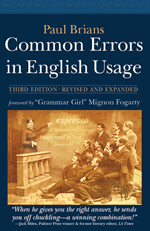caramel / carmel
yanira.vargasTake Highway 1 south from Monterey to reach the charming seaside town of Carmel, of which Clint Eastwood was formerly mayor. Dissolve sugar in a little water and cook it down until the sugar turns brown to create caramel. A nationwide chain uses the illiterate spelling “KarmelkornTM,” which helps to perpetuate the confusion between these two words.
BUY THE BOOK!
